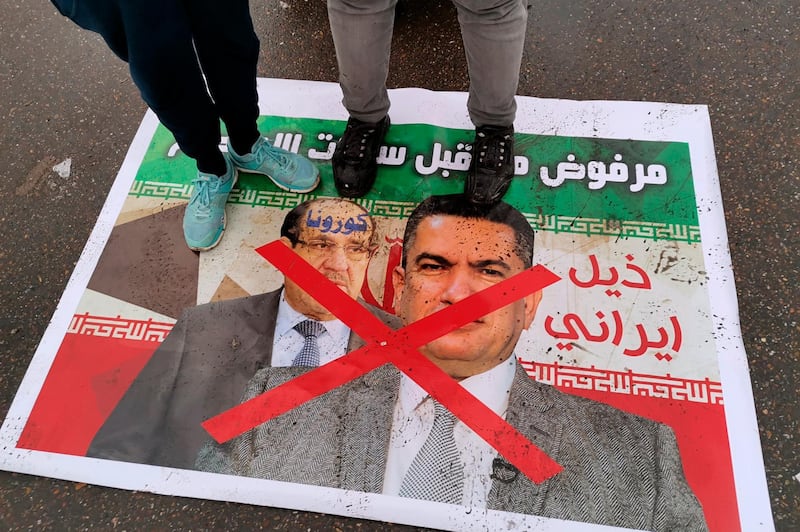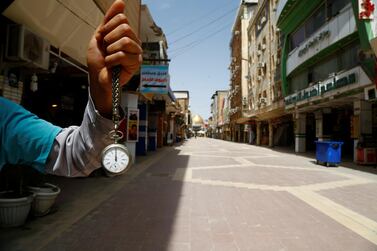The process of finding a new Iraqi Prime Minister is likely to last until the next round of elections, officials say, as political factions may block premier designate Adnan Al Zurfi from assuming office.
Mr Al Zurfi assumed the position in mid-March, almost three weeks after the previous nominee Mohammed Allawi failed to secure parliament's approval for his cabinet. Now Shiite political factions are rejecting Mr Al Zurfi's nomination and hinting at the possible nomination of Mustafa Al Khathimi, the director of the National Intelligence Service.
"We will see political parties nominating a new name every 45 days until the parliamentary session ends," a member of parliament, who asked not be identified, said.
"It is a way to waste time to keep Abdul Mahdi in power," he told The National. The process will likely continue until the next round of elections scheduled to be held in 2022, he said.
Government formation in Iraq has never been an easy process with marathon negotiations among political parties vying for power.
The latest round began when outgoing Prime Minister Adel Abdul Mahdi submitted his resignation at the end of November. He remains in office until the dominant political groups can agree on his successor.
In February, Mr Abdul Mahdi's allies in parliament rejected the appointment of Mr Allawi, the first prime minister designate proposed to replace him.
Mr Al Zurfi, the former governor of Najaf, was then nominated to fill the position after Iraqi President Barham Salih appointed him Prime Minister designate in mid-March. If he assumes office, Mr Al Zurfi said he will prepare the country for "free, fair, transparent elections" within a maximum period of one year from forming the next government.
He has until next Thursday to persuade officials in Baghdad to vote in his favour. Article 61 of the Iraqi Constitution states that a resigned government cannot stay more than 30 days in office. Yet more than four months have passed and "Adel Abdul Mahdi's government is still in power and nobody is speaking out against it," he said.
To overcome the political uncertainty, Mr Al Zurfi needs consensus from a dominant Shiite bloc that’s largely allied to Iran, the Fatah bloc. He must also gain the backing of the other major Shiite faction, Sairoon bloc, led by the populist cleric Moqtada Al Sadr. Kurdish and Sunni parties have shown no objection to his nomination so far.
But some Shiite parties have implied that Mr Al Khathimi should replace Mr Al Zurfi, who has overseen Iraq's intelligence efforts on the domestic and foreign fronts as well as maintained good relations with Iran and the US.
This is seen as a way of blocking Mr Al Zurfi's nomination, according to the former deputy prime minister, Bahaa Al Araji. "If you want to keep Abdel Mahdi in his position, announce it with courage and give the man the powers to deal with the country's crises," Mr Al Araji said.
What are Mr Al Zurfi’s chances of gaining parliament’s approval?
Many believe that the prime minister designate has no intention of withdrawing his nomination amid the pressures he faces.
Mr Al Zurfi has already written to Parliamentary speaker, Mohammed Al Halbousi, asking for a session to be convened, which shows he is confident of getting the votes, Sajad Jiyad, a Baghdad-based analyst, said.
“I don’t think he will withdraw his nomination and (he) wants to be given a chance to get a vote through first. If he fails to get enough votes then he may be prepared to step aside for another nominee,” Mr Jiyad said.
Mr Al Zurfi was asked to come up with signatures of at least ninety representatives in parliament in order to set the date of the session. So far, this figure has not been met.
"He still has a decent chance of forming the next government, he is currently the official nominee and still has the support of Sairoon, Nasr and other parties," Mr Jiyad said.
Getting to a parliamentary session will be the key, if there is quorum and a vote does happen then he probably can get the number required, Mr Jiyad said.
Mr Al Zurfi will fight to gain parliament's confidence "until the last minute and this is his constitutional right," Jaber Al Jaberi, a member of parliament for Anbar, told The National.
"Mustafa Al Kathimi will not accept the role if there is no consensus among the Shiite parties because he does not want to be blamed for their split," Mr Al Jaberi said.
Kurdish parties have voiced their support towards Mr Al Zurfi's cabinet.
"We have seen his plan and government agenda and it's not perfect but it's acceptable to us," a member of the Kurdish Democratic Party, said.
"We are preparing and are aware that he may not be able to implement it," the Kurdish official added.
Iraq needs a strong government to deal with current crisis and at this moment, Al Zurfi does not have the support of the powerful Shiite blocs," he said.







